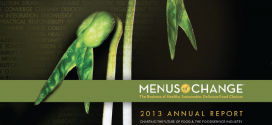Who’s in charge of your food? Before it reaches your plate, that is. The quick, over-arching answer is the FDA. But the actual, real-world answer is a bit more complex.
This Boston Globe piece by Deborah Kotz discusses the recent changes in some of the regulations that affect the ways food is produced, processed, packaged and sold—and some of the reasons behind these changes.
A little over a year ago, 6-year-old Owen Carrignan of Millbury developed a bad stomachache after returning home from a sleepover. The healthy first-grader was soon hospitalized with severe diarrhea and failing kidneys. He died less than a week later from a food-borne [E. coli] bacteria.
“We want answers, but there are no answers,” said Michelle Carrignan, Owen’s mother. “I have a hard time food shopping because I keep thinking there could be something here that killed my son.”
It’s because of frightful E.coli outbreaks like this one that the FDA has revisited—and reinforced—some of its food regulations that dictate how farmed produce is protected against contamination. The new laws mandate “regular federal inspections of produce farms and food processing facilities” and allows the FDA to “shut down companies that have hazardous operations” (fruit and vegetable companies, that is; meat production oversight is largely, if you’ll forgive us, toothless).
The new law mandates regular federal inspections of produce farms and food processing facilities and grants the FDA authority to make recalls of potentially tainted food mandatory, rather than voluntary. It also allows the FDA to “shut down companies that have hazardous operations”… mostly.
[T]he food safety law does not apply to 20 percent of the food supply—beef, chicken, pork, and processed egg products, like liquid egg whites—[which are] regulated by the US Department of Agriculture.
As Chris Waldrop, director of the Food Policy Institute at the nonprofit Consumer Federation of America notes, “We’re modernizing food safety but we’re not doing the same for meat and poultry, and that’s something Congress needs to look into.” For his part, Michael Taylor, the FDA’s deputy commissioner for Foods and Veterinary Medicine, says, “We know that we won’t get to a zero-risk food supply… But consumers have a right to expect that everything that can be done to prevent problems really will be done.”
That said, the new regulations don’t really cover “everything.” There are some broad exceptions; for example, Kotz notes that the rules regarding produce contamination “don’t apply to small establishments” whose annual sales amount to less than $250,000 to $1 million (this specific amount is yet to be determined).
While slaughterhouses must have USDA inspectors on site at all times, those inspectors can’t shut down a slaughterhouse or meat processing plant if government standards aren’t being followed. Nor can they issue a mandatory recall.
Farmers in Maine have launched a “food sovereignty” movement. Image originally appeared on NPR’s The Salt blog.
All of which brings us to this story by Maria Godoy, from the NPR food show/blog, The Salt, which covers the grassroots actions by Maine farmers at the “smaller” end of the spectrum. This group of farmers have organized in response to (well-intentioned) amendments to laws governing food production, which, in their implementation, have resulted in onerous and restrictive guidelines that essentially render irrelevant the very exceptions they were intended to provide.
Maine had passed a law that allowed small-scale poultry producers—those selling less than $1,000 worth per year—to slaughter the birds on their farms instead of at a slaughterhouse… but when state regulators wrote up rules for how the home slaughtering would work, they came up with a scheme that would cost a poultry farmer some $30,000 to $40,000 to implement, [farmers’ advocate Bob St. Peter] says.
To address this self-defeating food regulation legislation, the Maine farmers have banded together to campaign for towns to pass “food sovereignty ordinances,” which rule, as Godoy puts it, “that small local food producers don’t have to abide by state or federal licensing and inspection regulations if they are selling directly to consumers.” And while they’ve gotten a lot of support from small farmers and local-food lovers, these ordinances aren’t without their detractors—even in the small-farm community.
Kevin Poland… runs a family farm in Brooklin, Maine. He’s been a vocal opponent of the local food ordinances. “It has nothing to do with encouraging local farming,” Poland tells The Salt. “There’s plenty of that here. What there should be more encouragement of is food safety.”
Here at Aspire, we’re not biased on these topics one way or another—but we are biased in favor of the discussion itself. These legislative and philosophical issues are at the heart of the Master of Science in Regulatory Affairs of Food and Food Industries program offered by CPS (as long as we’re self-promoting, check out our sharp new video, here and below) and it’s why we’re fully in support of bringing these kinds of issues out into the open for informed and productive debate.
Where do you come down? Share your views on where our food comes from, and how best to make sure it arrives safely.

